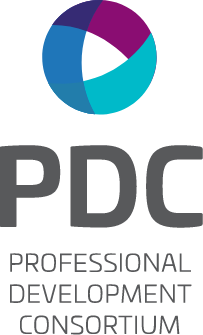You are here
You Have Something to Say (and your PD friends want to hear—or read—it!)
October 22, 2020

By Kiko Korn
As a PDC member, you are a goldmine of information. Why not share it? Or start a conversation? Or let people know you're thinking about what they're thinking about?
The PDC Blog is the perfect place for you to write about what's on your mind. With your help, the blog will be a wealth of institutional knowledge—a library of support, ideas, stories, answers, and connection.
This blog post is designed to inspire you to start writing. It's a blog post about blog posts (how meta!). If you want to learn even more, join me for a fun webinar on November 5 from 1-2 pm ET, hosted by the PDC. (Yes, it's two days after Election Day. Let's take a break from the craziness as we await election results!)
Brainstorming Topics
I know what you're thinking: "I don't know what to write about!" That might be true, but what's also true is that you have something interesting and valuable to share. The key is figuring out what that is.
Here are some prompts to get you started:
- What do you find yourself talking about with friends and colleagues?
- What challenges have you overcome for your team or organization in the last 6 months?
- What program or initiative have you set up that worked well?
- Have you used any takeaways you learned in a recent webinar?
- What book or article have you recently recommended to people?
- Who (at your organization or in the PDC) inspires you? Why?
Here are some hot topics I've heard people talking about at the virtual water cooler:
- implementing strategies for successfully navigating a remote format (shining on camera, combatting Zoom fatigue, fostering relationships)
- learning, mentoring, and being flexible in the age of COVID-19
- integrating DEI with PD
- expanding leadership initiatives and inclusive leadership
- establishing and meeting benchmarks
- sddressing mental health and wellness issues in times of uncertainty
What have you heard about?
Narrowing Your Focus
Peruse your answers to the questions and prompts above: Which ones do you gravitate toward?
Narrow your topics to the two that mean the most to you, and fill in these blanks:
1. This is important to me because __________________________.
2. I think others would benefit from learning about this topic because _______________________________________________________.
The answers should help you decide on a topic. If they don't, flip a coin. If you are disappointed with heads, go tails. There's your answer.
If your topic is broad, consider your angle. What special information or perspective do you have? What do you envision the reader doing with the information? Answering these questions can help you dig in and identify your objective.
Getting It All Down
Short blog posts are typically between 400 and 600 words--longer ones between 800 and 1200. Use those as general guidelines, but don't worry too much length at the drafting stage.
Before you start writing, make sure you have easy access to the tools you'll need: notes, handouts, research results, and the internet. I also recommend reading a few blog posts about a topic you like. Get a feel for their style, tone, and approach.
While blog posts can take on any number of forms, most posts have these parts:
- a catchy title
- a hook to pique the reader's interest
- a succinct explanation or exploration of the topic
- key takeaways or tips (nuggets, if you will)
At the drafting phrase, many writers start with a rough outline. Jot down the three main points you want to make, with support under each.
Okay, time to start writing. Imagine that you're talking to your reader, and let your words flow. Start in the middle if that's easier; then build around your idea. You might be surprised that your post feels like it's writing itself. (Make sure to keep track of anything you "borrow" from another source. You'll need to give it credit.)
Editing for Clarity, Concision, and Style
Once you have a draft, you can work your magic to turn your ideas into gold. The best posts are easy to read. They're clear, well organized, and visually pleasing. They tell a story the reader can follow. Every sentence moves the piece forward, and every word counts.
Here are 6 ways to keep your reader's attention:
- Use the white space: Keep your paragraphs short, and use headings, bullets, and numbered lists.
- Add visuals: Pick a photo that illustrates something about your topic, or use a chart or table to highlight information.
- Keep it simple: Prefer short words, phrases, clauses, and sentences to longer ones.
- Spice it up: You know what they say about "variety." Vary sentence length and structure to create rhythm.
- Be YOU: Keep a consistent voice, one that sounds like YOU. Imagine that you're talking to your reader.
- Get creative: Some posts have a theme woven throughout them, which can add interest when not overdone. Your theme can be anything from an image (did you notice my GOLD references?) to an approach (e.g., a top ten list, interview, or even a quiz).
Polishing Your Post
We know that you don't want to make a lasting impression for the wrong reasons. The great thing about writing for the PDC blog is that someone on the Communications Committee will sift through your words before publishing your post to make sure it shines.
Want Help?
Are you intrigued? Would you like help getting started? Please join me and your PDC colleagues on November 5 at 1 pm ET for a webinar designed to help you get your post in the hopper. You'll go from idea to draft in an hour.
Just one more thing: How many gold-related references can you find in this post? Please email me your list; I'll announce the winner at the webinar (and in a post next month)!
Kiko Korn is a PDC Trusted Advisor and the owner of Legal Writing Works, a training and consulting company that helps lawyers communicate more effectively in writing. She is known for her lively Zoom presence, surefire editing strategies, and ability to teach others how to make every word count. Read her full bio here.
You can reach Kiko at 310-242-1400 or kiko@legalwritingworks.com.


